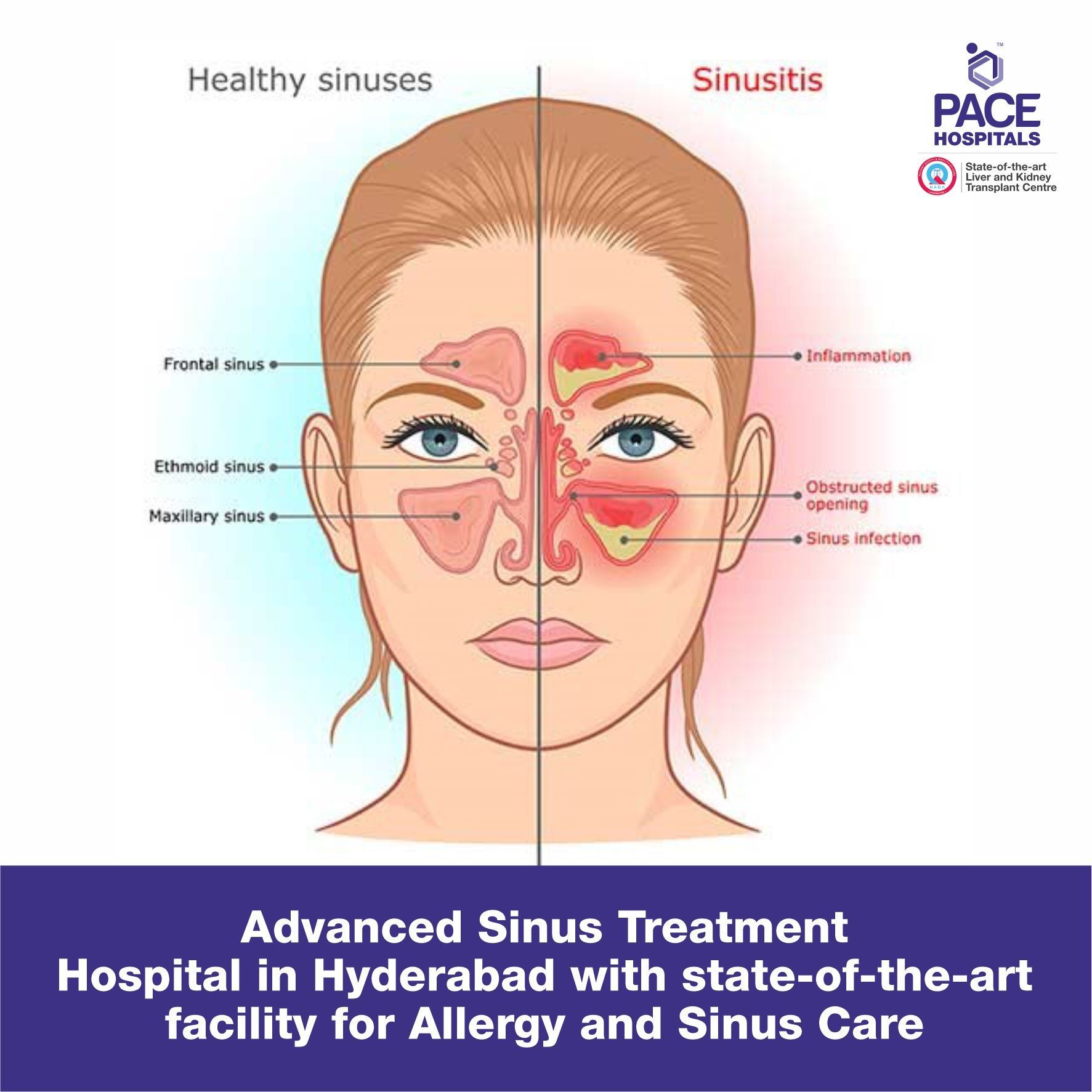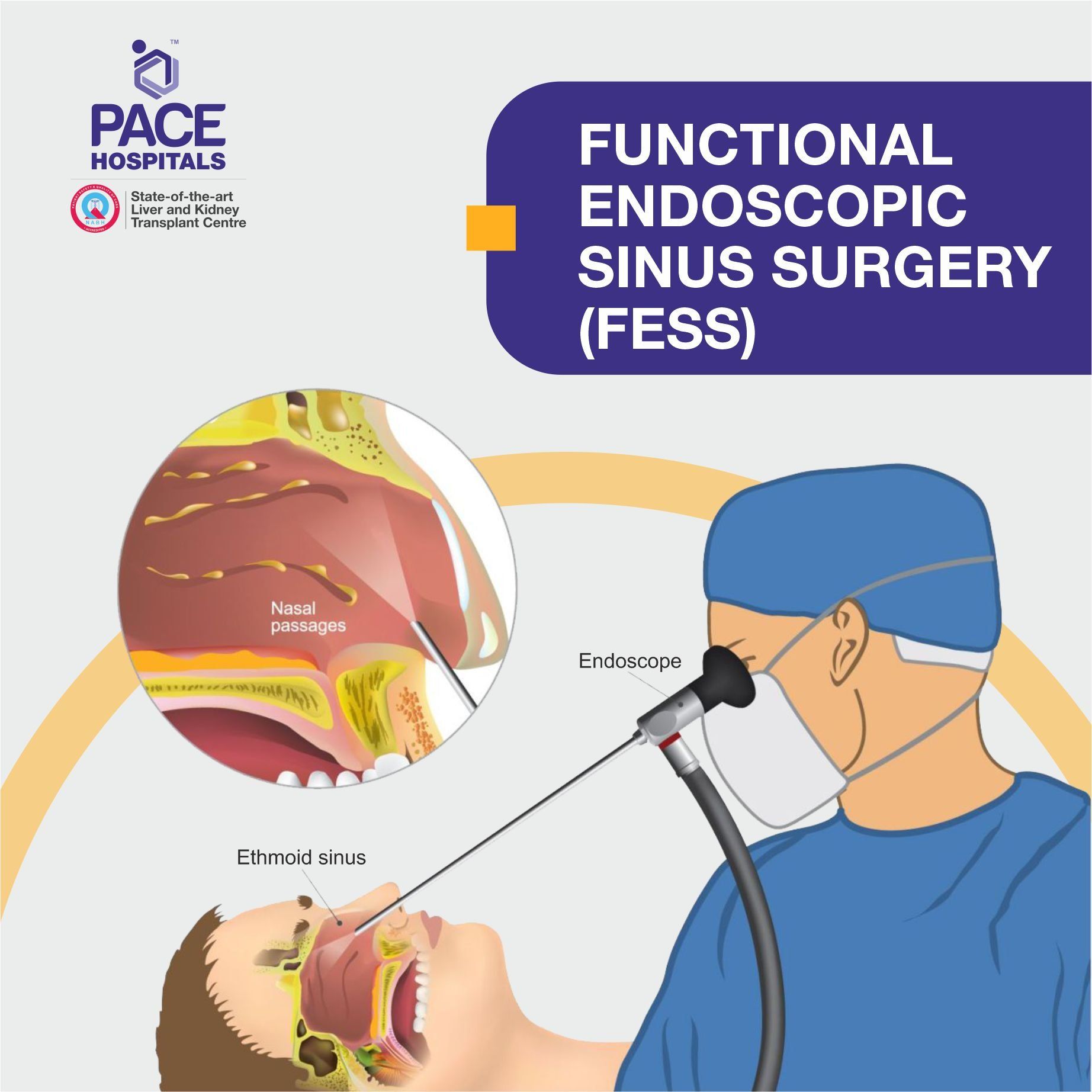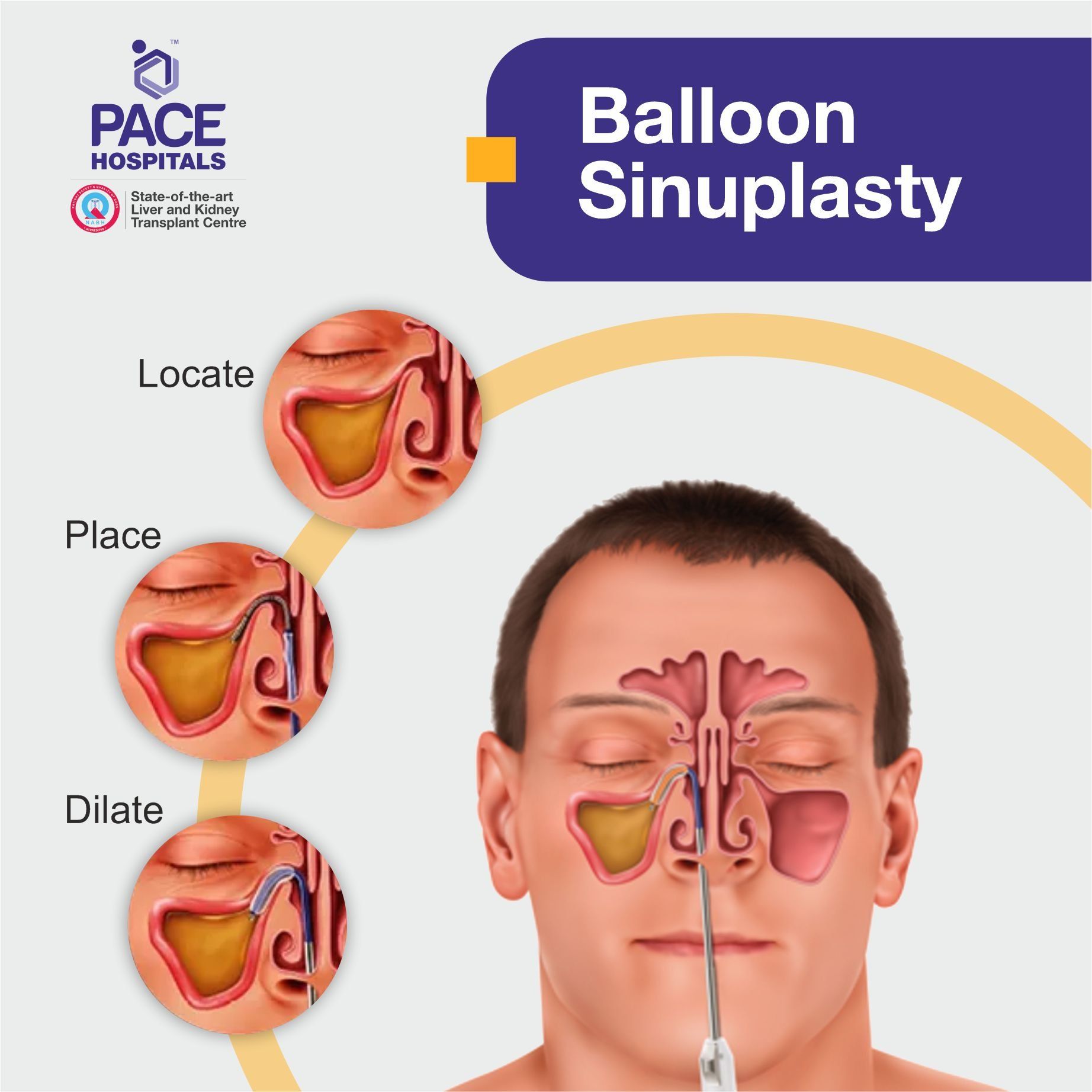हैदराबाद में साइनस का इलाज | साइनसाइटिस सर्जरी और लागत
हमारे साइनस विशेषज्ञ डॉक्टरों को साइनस संक्रमण और क्रोनिक साइनस संक्रमण की जटिलताओं के इलाज में व्यापक अनुभव है, जैसे:
- स्थानीय जटिलताएँ: चेहरे की कोशिकाशोथ, चेहरे के फोड़े, अस्थिमज्जाशोथ, और म्यूकोसील / म्यूकोपियोसील
- कक्षीय जटिलताएँ: सूजनयुक्त शोफ, कक्षीय कोशिकाशोथ, उपपेरिओस्टियल फोड़े, कक्षीय फोड़े, और गुहिका साइनस घनास्त्रता
- इंट्राक्रैनियल जटिलताएं (आईसी): मेनिन्जाइटिस, मस्तिष्क फोड़े (सबड्यूरल और एपिड्यूरल), इंट्रासेरेब्रल फोड़े, और ड्यूरल साइनस थ्रोम्बोसिस (कैवर्नस साइनस और सुपीरियर सैगिटल साइनस)
हैदराबाद में एलर्जी और साइनस देखभाल के लिए अत्याधुनिक सुविधाओं से युक्त उन्नत साइनस उपचार अस्पताल
हम हैदराबाद में उन्नत साइनस उपचार अस्पतालों में से एक हैं, जहाँ ईएनटी डॉक्टर, ईएनटी सर्जन, नर्सिंग और पैरामेडिकल स्टाफ़ उपलब्ध हैं। पेस हॉस्पिटल्स का ईएनटी विभाग अत्याधुनिक सुविधाओं और नवीनतम तकनीक से सुसज्जित है, जो साइनस संक्रमण का व्यापक उपचार प्रदान करता है और रोगियों को विश्व स्तरीय एलर्जी और साइनस देखभाल प्रदान करता है।
साइनसाइटिस का निदान
साइनसाइटिस के निदान में कई रक्त और इमेजिंग परीक्षण शामिल हैं। इनमें शामिल हैं:
नियमित रक्त परीक्षण. ये संक्रमण का पता लगाने में मदद करते हैं। इस संक्रमण के कारण श्वेत रक्त कोशिकाओं की संख्या बढ़ सकती है। एलर्जी या परागज ज्वर (हे फीवर) के कारण साइनसाइटिस होने पर इओसिनोफिल नामक विशिष्ट प्रकार की श्वेत रक्त कोशिकाओं में वृद्धि हो सकती है।
चूंकि एचआईवी एड्स, मधुमेह और अन्य कमजोर प्रतिरक्षा स्थितियों वाले व्यक्तियों में साइनसाइटिस होने की संभावना अधिक होती है, इसलिए इनके लिए रक्त परीक्षण की सिफारिश की जा सकती है।
ट्रांसइल्युमिनेशन परीक्षण: ईएनटी विशेषज्ञ डॉक्टर नाक के अंदर की जाँच के लिए एक विशेष प्रकाश का उपयोग करते हैं। इससे नाक के पॉलिप्स, नाक की हड्डी के स्पर्स, नाक के सेप्टम के विचलन और अन्य शारीरिक दोषों का पता लगाने में मदद मिलती है जो नाक के मार्ग को संकुचित कर सकते हैं और साइनसाइटिस का कारण बन सकते हैं। साइनस पर प्रकाश डाला जाता है। आमतौर पर साइनस खोखला दिखाई देता है और प्रकाश लाल रंग की चमक देता है। जब साइनस में सूजन हो जाती है और स्राव व बलगम से अवरुद्ध हो जाता है, तो प्रकाश चमक नहीं पाता और साइनस अपारदर्शी दिखाई देता है।
एक्स-रे: सामान्य साइनस माथे के दोनों ओर, नाक के पुल पर, गालों के पीछे और गालों की हड्डियों के नीचे खोखली काली गुहाओं के रूप में दिखाई देते हैं। सूजन होने पर, साइनस सफेद स्राव से अवरुद्ध दिखाई देते हैं और यह एक्स-रे पर भी दिखाई देता है।
नाक एंडोस्कोपी: साइनस के अंदरूनी हिस्सों की जाँच करने की एक नई विधि फ़ाइबरऑप्टिक एंडोस्कोप या राइनो स्कोप है। यह एक पतली, लचीली नली होती है जिसके सिरे पर एक कैमरा और एक लाइट लगी होती है। नाक के मार्ग को स्थानीय एनेस्थेटिक्स से चिकना किया जाता है और स्कोप को नाक में डाला जाता है। इस उपकरण से साइनस की अंदरूनी दीवारों और अस्तरों को देखा जा सकता है।
सीटी स्कैन या एमआरआई स्कैन: जब फंगल साइनसाइटिस या साइनस ट्यूमर का संदेह हो या उसे खारिज करना आवश्यक हो, तो साइनस की अल्ट्रासाउंड, सीटी स्कैन या एमआरआई स्कैन जैसी इमेजिंग जाँचें की जा सकती हैं। ये नाक और साइनस की शारीरिक असामान्यताओं का पता लगाने में भी मदद करती हैं।
एलर्जी परीक्षण: एलर्जी से पीड़ित लोगों को एलर्जी के कारण का पता लगाने के लिए एलर्जी परीक्षण की सलाह दी जा सकती है।
स्वेट क्लोराइड परीक्षण: नाक और साइनस की सिलिअरी कोशिकाएँ ठीक से काम कर रही हैं या नहीं, इसका पता लगाने के लिए कुछ परीक्षण उपलब्ध हैं। स्वेट क्लोराइड परीक्षण सिस्टिक फाइब्रोसिस को रोकने के लिए किए जाते हैं जो साइनसाइटिस का कारण बनता है।
नाक और साइनस की परत की कोशिकाओं को नमूने के रूप में लिया जाता है और असामान्यताओं के लिए सूक्ष्मदर्शी से उनकी जाँच की जाती है। साइनसाइटिस के निदान में जिन स्थितियों को खारिज किया जा सकता है (क्योंकि ये साइनसाइटिस के लक्षणों से मिलते-जुलते हैं) उनमें एलर्जिक राइनाइटिस, सामान्य सर्दी-ज़ुकाम, बच्चों में एडेनोइडाइटिस और सिरदर्द के अन्य कारण शामिल हैं।
हल्के और जीर्ण साइनसाइटिस का उपचार
साइनसाइटिस का इलाज कई तरीकों से किया जाता है, और यह इस बात पर निर्भर करता है कि साइनसाइटिस का मामला कितना गंभीर है।
साधारण साइनसाइटिस संक्रमण का इलाज इस प्रकार किया जाता है:
- सर्दी खांसी की दवा
- सर्दी और एलर्जी की दवाएं
- नाक से खारा सिंचाई
- तरल पदार्थ पीना (साइनसाइटिस एक वायरल संक्रमण है और तरल पदार्थ से लाभ होगा)
यदि साइनसाइटिस के लक्षण 10 दिनों के बाद भी ठीक नहीं होते हैं, तो ईएनटी डॉक्टर निम्नलिखित दवाएं लिख सकते हैं:
- एंटीबायोटिक्स (वयस्कों में सात दिन और बच्चों में 10 दिन)
- मौखिक या सामयिक डिकंजेस्टेंट
- प्रिस्क्रिप्शन इंट्रानेजल स्टेरॉयड स्प्रे। (बिना प्रिस्क्रिप्शन वाले स्प्रे या ड्रॉप्स का इस्तेमाल तीन से पांच दिनों से ज़्यादा न करें - ये वास्तव में कंजेशन बढ़ा सकते हैं)
दीर्घकालिक (क्रोनिक) साइनसाइटिस का इलाज अंतर्निहित स्थिति (आमतौर पर एलर्जी) पर ध्यान केंद्रित करके किया जा सकता है। आमतौर पर इसका इलाज इस प्रकार किया जाता है:
- इंट्रानेजल स्टेरॉयड स्प्रे
- सामयिक एंटीहिस्टामाइन स्प्रे या मौखिक गोलियां
- सूजन और एलर्जी के लक्षणों को कम करने के लिए ल्यूकोट्रिएन प्रतिपक्षी
- नाक को खारे घोल से धोना जिसमें अन्य प्रकार की दवाएँ भी हो सकती हैं
जब साइनसाइटिस उपरोक्त उपचारों में से किसी एक से भी नियंत्रित नहीं होता है, तो आपके साइनस की बेहतर जाँच के लिए सीटी स्कैन का उपयोग किया जाता है। परिणामों के आधार पर, आपके साइनस में संरचनात्मक समस्याओं को ठीक करने के लिए सर्जरी की आवश्यकता हो सकती है। ऐसा होने की सबसे अधिक संभावना तब होती है जब आपको पॉलीप्स और/या फंगल संक्रमण हो।
साइनसाइटिस के इलाज के लिए साइनस सर्जरी
कार्यात्मक एंडोस्कोपिक साइनस सर्जरी (FESS)
आज के सबसे आम साइनस सर्जरी विकल्पों में से एक, FESS एक ऐसी प्रक्रिया है जिसमें साइनस को देखने और किसी भी प्रभावित ऊतक या हड्डी को हटाने के लिए एक आवर्धक एंडोस्कोप का उपयोग किया जाता है। यह साइनस और नाक के बीच के कनेक्शन को खोलने के लिए पुनर्निर्माणात्मक है। इसके परिणामस्वरूप बेहतर जल निकासी, रुकावटें कम होना और संक्रमित पदार्थ को बाहर निकालना चाहिए, साथ ही नाक के सामान्य संचालन के लिए स्वस्थ ऊतक बनाए रखना चाहिए। जैसा कि नाम से ही स्पष्ट है, यह प्रक्रिया एंडोस्कोपिक है। ईएनटी सर्जन नाक के अंदर छोटे चीरे लगाता है ताकि नाक गुहा के अंदर का निरीक्षण करने के लिए अंत में एक कैमरा और प्रकाश वाली एक छोटी ट्यूब (एंडोस्कोप) डाली जा सके। FESS अक्सर सेप्टोप्लास्टी जैसे अन्य साइनस सर्जरी विकल्पों के साथ संयोजन में किया जाता है।
बैलून साइनुप्लास्टी
बैलून साइनुप्लास्टी एक न्यूनतम आक्रामक प्रक्रिया है जिसे रोगियों के इलाज और क्रोनिक साइनसाइटिस के लक्षणों से राहत देने के लिए डिज़ाइन किया गया है। यह विधि एक सरल अनुप्रयोग है जिसमें डॉक्टर साइनस मार्ग में एक लचीला बैलून कैथेटर डालते हैं। इस प्रक्रिया में एक छोटे से तार की सहायता ली जाती है जिसके सिरे पर एक टॉर्च लगी होती है जो नेविगेशन में मदद करती है। एक बार बैलून सही जगह पर लग जाने पर, साइनस गुहा को खोलने के लिए इसे धीरे-धीरे फुलाया जाता है। ईएनटी डॉक्टर बलगम और मवाद को बाहर निकालने में मदद के लिए एक सलाइन सॉल्यूशन का उपयोग करते हैं। कई रोगियों को तरल पदार्थ के निकलने पर दबाव में तुरंत राहत महसूस होती है। साइनस गुहा पर बैलून का हल्का दबाव हड्डियों और उपास्थि के पुनर्निर्माण में मदद करता है। इसे हटाने के बाद, साइनस साफ़ महसूस होने चाहिए।
साइनसाइटिस उपचार - अक्सर पूछे जाने वाले प्रश्न
साइनसाइटिस के लक्षण क्या हैं?
साइनसाइटिस के लक्षण सर्दी-जुकाम जैसे ही होते हैं। लेकिन, साइनसाइटिस में आपके चेहरे पर दबाव (खासकर गालों, नाक, आँखों और माथे के आसपास) और दांतों या कानों में दर्द हो सकता है। इसके अलावा, आपको ये भी महसूस हो सकता है:
- खांसी, 100.4 F या उससे अधिक का उच्च तापमान (बुखार)
- धुंधला, रंगहीन नाक या नाक से टपकना (बलगम गले से नीचे टपकना)
- नाक से स्राव (नाक से गाढ़ा पीला या हरा स्राव)
- हैलिटोसिस (सांसों की दुर्गंध)
यदि आपको 5 साल से ज़्यादा समय तक लगातार लक्षण दिखाई देते हैं, तो आपको साइनस संक्रमण हो सकता है। आपको कान, नाक और गले के साथ-साथ चेहरे और गर्दन की समस्याओं के विशेषज्ञ ईएनटी डॉक्टर से परामर्श लेना चाहिए। आपके लिए सबसे अच्छे ईएनटी विशेषज्ञ और हैदराबाद में साइनस सर्जरी के लिए सबसे अच्छे अस्पताल का चयन करना, क्रोनिक साइनसाइटिस के कारण की पहचान करना और आगे के उपचार के लिए डॉक्टर से परामर्श लेना बहुत ज़रूरी है।
डॉक्टर से कब मिलें?
हल्के लक्षण भी चिंताजनक हो सकते हैं, यदि आपको निम्नलिखित संकेत या लक्षण दिखाई दें जो गंभीर संक्रमण का संकेत हो सकते हैं तो ईएनटी विशेषज्ञ से परामर्श लें:
- बुखार
- गर्दन में अकड़न
- भ्रम
- भयंकर सरदर्द
- माथे की सूजन
- आपकी आँखों के आसपास सूजन या लालिमा
- दोहरी दृष्टि या अन्य दृष्टि परिवर्तन
साइनसाइटिस में सर्जरी कब आवश्यक होती है?
इन स्थितियों में साइनसाइटिस के इलाज के लिए सर्जरी की सलाह दी जाती है:
- क्रोनिक राइनो साइनसाइटिस जो चिकित्सा उपचार के प्रति अनुत्तरदायी है
- आवर्तक तीव्र साइनसाइटिस
- नाक के पॉलीप्स
- म्यूकोसील
- साइनस में फंगल द्रव्यमान
- साइनोनासल ट्यूमर
- सीएसएफ राइनोरिया
साइनस सर्जरी की जटिलताएं क्या हैं?
साइनस सर्जरी की जटिलताएँ दुर्लभ हैं। दर्ज की गई कुछ जटिलताएँ इस प्रकार हैं:
- इंट्रा ऑपरेटिव: रक्तस्राव, वसा हर्नियेशन, सीएसएफ रिसाव, रेट्रो-ऑर्बिटल रक्तस्राव, मध्य रेक्टस क्षति, ऑप्टिक तंत्रिका क्षति
- ऑपरेशन के बाद: रक्तस्राव, आसंजन, एपिफोरा, पेरिऑर्बिटल एम्फिसीमा, एनोस्मिया, फ्रंटल रिसेस स्टेनोसिस, क्रस्टिंग, संक्रमण, ओस्टाइटिस, न्यूरोपैथिक दर्द
साइनस सर्जरी कितनी खतरनाक है?
साइनस सर्जरी एक सुरक्षित प्रक्रिया है। साइनस सर्जरी की गंभीर जटिलताएँ दुर्लभ हैं। सर्जरी के बाद आपको अत्यधिक रक्तस्राव हो सकता है। यदि आपको बहुत अधिक रक्तस्राव होता है, तो आपको रक्त आधान की आवश्यकता हो सकती है। कुछ लोगों को दृष्टि संबंधी समस्याएँ या सूंघने की क्षमता में कमी हो सकती है। जो बहुत दुर्लभ है। FESS के बाद परिणाम अच्छे होते हैं, और अधिकांश अध्ययनों में 80 से 90 प्रतिशत सफलता दर की रिपोर्ट की गई है।
साइनस सर्जरी के बाद दर्द कितने समय तक रहता है?
साइनस की सर्जरी या तो मॉनिटर्ड एनेस्थेटिक केयर या सामान्य एनेस्थीसिया के तहत की जाती है। इसलिए, सर्जरी के बाद दर्द बहुत कम या नगण्य होता है। आमतौर पर, सर्जरी के बाद एक दिन तक मरीज़ों को नाक में रुकावट और नाक बंद होने के साथ-साथ कभी-कभी हल्का दर्द भी महसूस हो सकता है।
क्या एंडोस्कोपिक प्रक्रिया सुरक्षित है?
साइनसाइटिस के लिए अन्य सभी शल्य चिकित्सा प्रक्रियाओं में से, एंडोस्कोपिक साइनस सर्जरी बेहतर परिणाम देती है। यह दुनिया भर में साइनसाइटिस के लिए सबसे व्यापक रूप से की जाने वाली और पसंदीदा सर्जरी है।
बैलून साइनस सर्जरी के बाद ठीक होने में कितने दिन लगेंगे?
साइनसाइटिस के लिए चाहे कोई भी प्रक्रिया अपनाई जाए, जैसे FESS या बैलून साइनुप्लास्टी। सर्जरी के बाद पूरी तरह ठीक होने में आमतौर पर 1-2 दिन लगते हैं।
भारत में नाक एंडोस्कोपी की लागत क्या है?
औसत भारत में नाक की एंडोस्कोपी की लागत 700 रुपये से 1,500 रुपये तक हो सकती है (सात सौ से एक हजार पांच सौ)। हालाँकि, भारत में नाक की एंडोस्कोपी की लागत अलग-अलग शहरों के अलग-अलग अस्पतालों के आधार पर अलग-अलग होती है।
हैदराबाद में नाक की एंडोस्कोपी की लागत 800 रुपये से 1,200 रुपये तक हो सकती है (आठ सौ से एक हजार दो सौ)। हालाँकि, हैदराबाद में नाक एंडोस्कोपी की लागत अलग-अलग अस्पतालों, दवाओं और कैशलेस उपचार विकल्पों के आधार पर अलग-अलग होती है।
भारत में साइनस सर्जरी की लागत क्या है?
औसत भारत में साइनस सर्जरी की लागत 30,000 रुपये से 75,000 रुपये तक हो सकती है (पैंतीस हज़ार से पचहत्तर हज़ार तक)। हालाँकि, भारत में साइनस सर्जरी की लागत अलग-अलग शहरों और अस्पतालों के आधार पर अलग-अलग हो सकती है।
हैदराबाद में साइनस सर्जरी की लागत 25,000 रुपये से 70,000 रुपये तक हो सकती है (पच्चीस हज़ार से सत्तर हज़ार तक)। हालाँकि, हैदराबाद में साइनस सर्जरी की लागत अलग-अलग हो सकती है और यह कई कारकों पर निर्भर करती है जैसे सर्जरी का चयन, अस्पताल में रहने के लिए कमरा, और बीमा या कॉर्पोरेट कैशलेस सुविधा।
भारत में कार्यात्मक एंडोस्कोपिक साइनस सर्जरी की लागत क्या है?
औसत की लागत भारत में कार्यात्मक एंडोस्कोपिक साइनस सर्जरी की लागत 35,000 रुपये से 55,000 रुपये तक हो सकती है (पैंतीस हज़ार से पचपन हज़ार तक)। हालाँकि, भारत में कार्यात्मक एंडोस्कोपिक साइनस सर्जरी की लागत अलग-अलग शहरों और अस्पतालों के आधार पर भिन्न हो सकती है।
हैदराबाद में फंक्शनल एंडोस्कोपिक साइनस सर्जरी की लागत 40,000 रुपये से 45,000 रुपये तक हो सकती है (चालीस हजार से पैंतालीस हजार)। हालांकि, हैदराबाद में फंक्शनल एंडोस्कोपिक साइनस सर्जरी की लागत अलग-अलग हो सकती है और यह अस्पताल में रहने के लिए कमरे के चयन, सर्जरी पैकेज के अलावा इलाज के दौरान ली जाने वाली सेवाओं और कैशलेस इलाज के मामले में स्वास्थ्य बीमा, केंद्र सरकार स्वास्थ्य योजना (सीजीएचएस), कर्मचारी और पत्रकार स्वास्थ्य योजना (ईएचएस), कर्मचारी राज्य बीमा (ईएसआई) आदि की मंजूरी पर निर्भर करती है।
भारत में बैलून साइनुप्लास्टी की लागत क्या है?
औसत भारत में बैलून साइनुप्लास्टी की लागत 45,000 रुपये से 75,000 रुपये तक हो सकती है (पैंतालीस हज़ार से पचहत्तर हज़ार तक)। हालाँकि, भारत में बैलून साइनुप्लास्टी की लागत अलग-अलग शहरों और अस्पतालों के आधार पर अलग-अलग हो सकती है।
हैदराबाद में बैलून साइनुप्लास्टी की लागत 40,000 रुपये से 70,000 रुपये तक हो सकती है (चालीस हज़ार से सत्तर हज़ार)। हालाँकि, हैदराबाद में बैलून साइनुप्लास्टी की लागत अलग-अलग हो सकती है, और यह कई कारकों पर निर्भर करती है जैसे कि कमरे का चयन और कैशलेस सुविधा के लिए बीमा।
पेस हॉस्पिटल क्यों?
- 150 बिस्तरों वाला सुपर स्पेशियलिटी अस्पताल, सीजीएचएस और आईएसओ मान्यता।
- एनएबीएच और एनएबीएल मान्यता।
- अत्याधुनिक लिवर और किडनी प्रत्यारोपण केंद्र।
- सुचारू कैशलेस लाभ के लिए सभी टीपीए के साथ पैनलबद्ध।
- केंद्रीकृत एचआईएमएस (अस्पताल सूचना प्रणाली)।
- कम्प्यूटरीकृत स्वास्थ्य रिकॉर्ड वेबसाइट के माध्यम से उपलब्ध हैं।
- इनपेशेंट और आउटपेशेंट के लिए न्यूनतम प्रतीक्षा समय।
- उच्च योग्यता प्राप्त सर्जनों और चिकित्सकों से चौबीसों घंटे मार्गदर्शन।
- नैतिक चिकित्सा देखभाल का मानकीकरण।
- 24X7 बाह्य रोगी एवं अंतः रोगी फार्मेसी सेवाएं।
- अत्याधुनिक ऑपरेशन थिएटर।
- आईएसओ-9001 मान्यता के साथ गहन देखभाल इकाइयाँ (शल्य चिकित्सा और चिकित्सा)।




